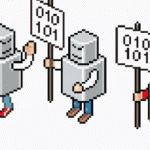The Times They Are a Changin’
 Flashback 1991-
Flashback 1991-
Waking up in the morning, birds chirping, having breakfast and listening to the gentle crackle of the newspaper s the parents are flipping through whilst sipping their coffees. The doorbell rings. It’s the postal delivery man with a few lovely (handwritten) letters from friends and family all over the world. The exact kind of hand written letters which give you a warm fuzzy feeling inside. After a while, the mother decides to make something special for lunch, and searches through her many big, heavy cookbooks for the perfect one, bookmarking her few selections to choose from.
A typical Saturday morning …
Fast forward 20 years-
Waking up in the morning, checking e-mail/Facebook notifications/tweets on the iPhone/Blackberry/Android/iPad/whatever is closest to the bed, ignoring the few birds chirping, getting stressed out reading the various messages/texts/emails/tweets whilst making coffee. I foresee no fuzzy feelings today…
Going into the kitchen, the parents are sitting reading news online and chatting away on their respective laptops. For the recipe of the day, the mother searches away on Google to find that perfect Saturday meal. When she does, she continues to YouTube, where she can see how to make said recipe. The cookbooks sit idly by, on the kitchens shelves, collecting dust. This is what ‘Vintage’ must feel like.
The point of this post (and yes, there is one) is the following:
When was the last time you actually flipped through pages of a book for a few hours before going to bed? With Kindle and other e-book readers, going into a beautiful bookstore and judging books by their covers is a thing of the past. To prove that point, Borders Books just went bankrupt.
When was the last time you checked an actual recipe book for instructions, or any other manual or encyclopedia for that matter, when you have everything online?
Have you tried writing a paragraph lately? Strange sensation to actually write using an actual pen isn’t it?
Do you remember how a newspaper even smells like anymore? With Twitter, everyone is a journalist!
Social Media, and other technologies in this day and age are indeed a blessing… a blessing in disguise perhaps?







 Social network marketing is the electronic equivalent of grass-roots marketing: Marketing where people live and work, and on a personal level.
Social network marketing is the electronic equivalent of grass-roots marketing: Marketing where people live and work, and on a personal level.